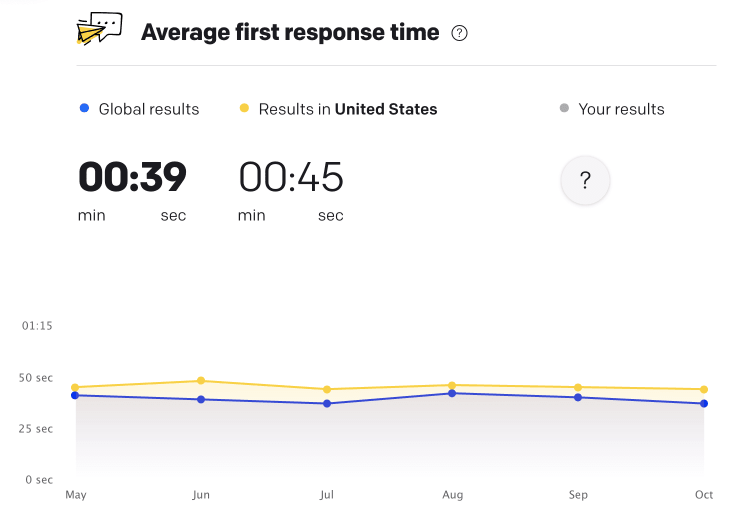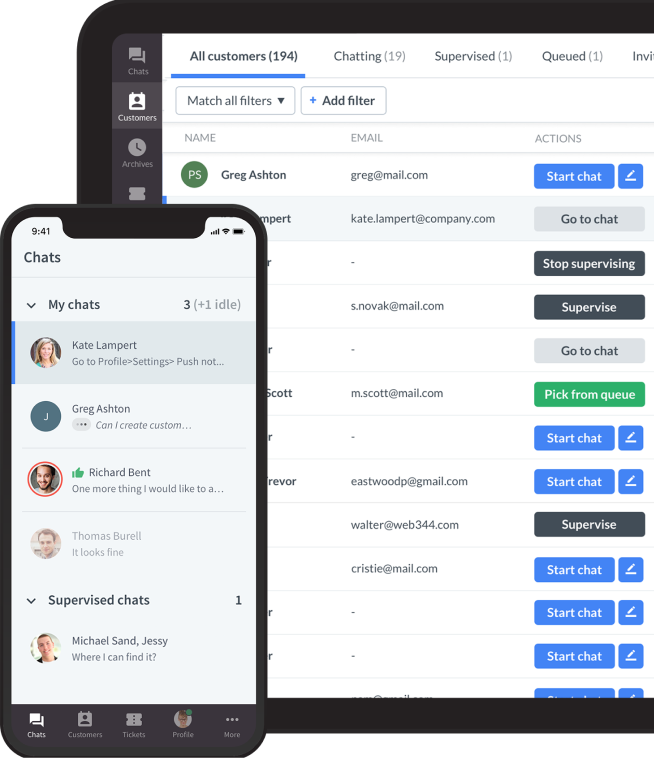Showing top 0 results 0 results found
Showing top 0 results 0 results found

It is estimated that the global market for live chat software will reach $1.7 billion by 2030, up from $755.23 million in 2020 (AMR). Unlike the rise and fall of cryptocurrencies, this is no digital market bubble, as data shows live chat solutions bring value to businesses and customers alike, becoming a staple of good customer service.
Live chat statistics show the trends in customer expectations when it comes to excellent customer service. This article mentions a range of data points from various sources, including the Interactive 2022 Customer Service Report based on LiveChat data. LiveChat is actively used by over 37,000 companies worldwide and supports over 75 million chats monthly.

Live chat outperforms phone and email
When compared with live chat statistics for 2017, we see that customers expect to chat online with businesses, and are quite ready to overlook small inconveniences as long as the overall experience is satisfactory.

41% of customers prefer live chat over phone and email support, or social media, even though 42% of businesses believe consumers prefer phone support (kayako). Compared with the latter, web chat customer service teams rarely put customers on hold. Short waiting times and contact with a real person make live chat software the preferred mode of communication for customers.
This is hardly surprising, as the first response time for chats in 2022 has been below 40 seconds (Generation Z Communication Trends Report). A phone helpline can hardly compete with such an average wait time.

Once connected with live chat customer support, online consumers are willing to spend more time on chat: the average chat length, ten minutes in 2022, is likely to go up to twelve minutes in 2023 (Generation Z Communication Trends Report).
You can use the Local Customer Service Benchmark to check the live chat stats for particular industries or countries.

Live chat statistics for ecommerce
According to a Forrester report, the biggest value of live chat service for ecommerce lies not in getting the website visitors to buy while on chat, but rather in the opportunity to recommend products, check when sought for items will be back in stock, or schedule in-store appointments. This may be why companies are not too keen on sharing their live chat conversion statistics. The ROI comes in the form of customer experience and customer loyalty.
Live chat stats from a study conducted by kayako show that customers expect live chat to be available on a website: 52% of customers prefer to stick to a business that provides live chat support and 51% of online consumers declare they are more likely to make a digital purchase from a brand that offers live chat customer service.

To put their money where their mouth is, 63% of those who spend between $250 and $500 a month online are more likely to buy from companies with live chat and stay loyal to them. And money is at stake, as 29% of customers reported their good live chat experience with their friends and family while 20% of customers shared their poor customer service experience (kayako). Creating a great customer experience makes the dark social work in your favor.
Additionally, many live chat software tools offer customizable engagement features, such as automatic pop-up messages (AKA greetings), on the basis of whether you aim to turn website visitors into leads or target returning customers.
Customers prefer live chat
Around the world, the majority of customer interactions with companies take place online. This number has gone up to 60% from about 40% in 2019 (Insider Intelligence).

While initially some of the businesses and consumers only relocated online due to external circumstances, this trend is unlikely to reverse, as interacting online has proved to be convenient to the customers and cost-effective for businesses. For example, the ability to multitask is one of the reasons 51% of customers prefer live chat (Invesp).
In the service of convenience, businesses should also make sure that the mobile version of their website offers a smooth chatting experience, as the proportion of chat started on mobile devices is steadily increasing, reaching almost 50% in 2022.

While convenience plays a big part in the customer experience, 95% of consumers place more value on quality than speed (kayako). Both can be improved with canned responses, pre-made messages that can be sent in chat at a click of a button, and intelligently applied automation.
Live chat and chatbots
Organizations that used chatbots in 2019 saved an average of $300,000. Leveraging the chat tool on your website can help your organization reduce staff and high turnover costs, and improve overall customer experiences.
The number of chats a month per agent went up on average by 33% in 2021 (comm100), a trend that’s very likely to continue. While customers are more willing than before to use live chat customer service, according to 82% of consumers, instant responses to questions are crucial when dealing with brands (Business 2 Community).

Among customers, 64% say 24/7 service is the most helpful chatbot feature (The Chatbot).
It should not be surprising then that 62% of customers prefer using customer service bots to waiting for human agents to respond (Tidio).
In fact, when searching for simple answers, 74% of internet users prefer chatbots (PSFK), while for 40% of web users it doesn’t matter whether they get customer service from a bot or a human agent as long as they get what they need (HubSpot).
This is reflected in the number of chat bot chats: according to the Generation Z Communication Trends Report, the monthly average of bot chats per business in June 2022 was 253. This number is expected to rise to 312 monthly by the end of the year and increase to 350 in 2023.

On the business side of things, 65% of organizations report that if chatbots could reduce the number of inquiries to their call center, agents would then be trained to handle different or additional tasks – chatbots will not replace them (bold360).
Offer live chat support on your website
Customer engagement is paramount in any commercial enterprise. In 2022, a business that offers live chat support to its customers provides the convenience and comfort instrumental in both converting and retaining its customer base.
Implementing live chat lets you harness its flexibility and cost-effectiveness to optimize the customer journey and ensure customer loyalty.
Get a glimpse into the future of business communication with digital natives.
Get the FREE report








Comments